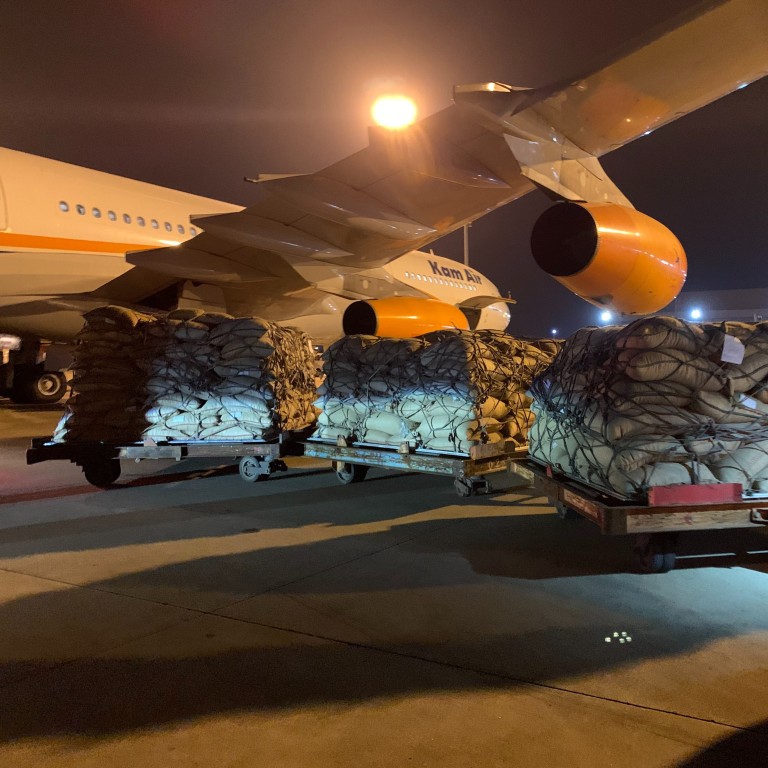
China reopens Afghan trade lifeline but no rush to recognise Taliban
- Beijing carefully steps up engagement with trade and aid as the war-torn country faces a humanitarian crisis
- Shanghai pine nut delivery is first to arrive since the insurgent group formed an interim government in Kabul

China’s ambassador to Afghanistan Wang Yu, who attended a ceremony at Kabul airport with Taliban officials, announced the shipment’s arrival at Pudong airport on Twitter.
“The income [to be] reaching hundreds of millions of US dollars, greatly benefiting many Afghan farmers, etc. The little pine nuts bring happiness to Afghan people and good taste to Chinese people, and ‘pine nut air corridor’ is the important bond of friendship between our two countries,” he wrote.
Wang said the two sides had “overcome numerous difficulties” to make the flight possible.
“China firmly pursues a friendly policy toward all Afghan people, besides more humanitarian assistance to Afghanistan,” he wrote, adding that tens of thousands of tonnes of pine nuts would be exported to China in the coming months.

03:16
Afghan hospital struggles to handle overflowing patients with dwindling supplies
China, a major importer of Afghan pine nuts, established the air cargo link with Afghanistan in 2018 when the US-backed Afghan government was trying to offset its trade deficit by turning one of the world’s poorest countries into an exporting nation.
Since then, tens of thousands of tonnes of the pine nuts – known as Afghanistan’s “export gold” – have travelled to China via the air corridor each harvest season, which usually starts in September. In 2018, an estimated 23,000 tonnes of pine nuts made the journey.
Trade between the two countries was largely disrupted last year through the combination of the Covid-19 pandemic and the escalating conflict between the Taliban and Afghan government forces.
China calls for end to sanctions on Afghanistan ‘as soon as possible’
Zhang Weiwei, an Afghanistan studies specialist at Lanzhou University, said the resumption of the pine nuts trade was a “pragmatic and economically reasonable” decision for both China and Afghanistan.
“It could lay the foundation for further development in bilateral ties. By resuming, developing and strengthening agriculture trade, it could also help reduce opium production [in Afghanistan] and push forward bilateral economic and trade relations,” he said.
Afghan pine nuts have been long popular in the Chinese market. In an earlier exclusive interview with India’s English language news channel WION, the Taliban’s acting commerce and industries minister Nooruddin Azizi said the interim government had pinned its hopes on the pine nut trade to boost its declining economy.
The country is grappling with an economic crisis, with its assets frozen in the US and foreign aid largely suspended. A recent report from the UN’s World Food Programme and its Food and Agriculture Organization warned more than half of Afghanistan’s 40 million people are projected to face an “acute” food crisis this winter.
‘We had nothing to eat’: starving Afghans sell young girls into marriage
Beijing has not officially recognised the Taliban government and has said it will not be the first to do so, but it is carefully stepping up its engagement with the interim government.
During his visit to Doha two weeks ago, Chinese foreign minister Wang Yi met a delegation led by the acting deputy prime minister Mullah Abdul Ghani Baradar and acting foreign minister Amir Khan Muttaqi. It was their first official face-to-face meeting since the militant group took power in Kabul two months ago.
The Chinese foreign ministry said the two sides “discussed bilateral interactions and agreed to set up a working-level mechanism”, though no further details were given. After the meeting, a video posted on Facebook by the Afghanistan Pine Nuts Union showed Muttaqi presenting Wang with a box of Afghan pine nuts.

06:22
Why Afghanistan matters to China as US withdraws from war-torn country
“Trade can influence the new Taliban regime and is an important policy tool to drive it towards peace and away from terrorism,” Zhang said. “It has also helped to alleviate the widespread crisis facing the Afghan people.”
China is Afghanistan’s third largest trading partner, after Pakistan and Iran, but bilateral trade remains very small and is mostly limited to agricultural products, which also include saffron and pomegranates. In 2020, bilateral trade was only US$550 million, less than 0.1 per cent of China’s overall goods trade.

